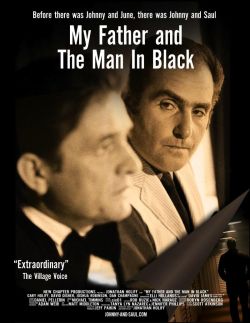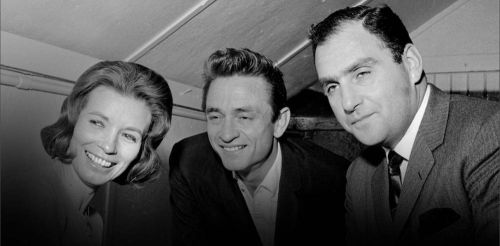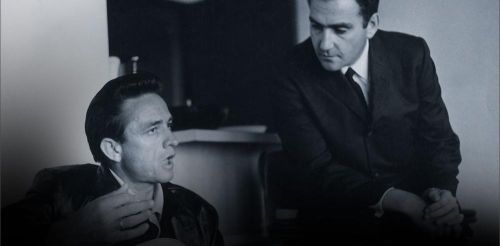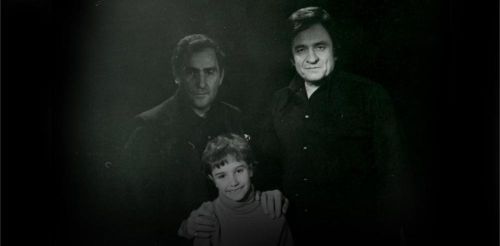 There’s a personal pet peeve I had to get past during my viewing of My Father and the Man in Black. And that’s that I simply can’t abide biopic documentaries or films where the subject or real people portray themselves in reenactments. It’s just too damned meta for me. It’s an unusual pet peeve I admit, but it is a narrowly targeted one though. It doesn’t apply to real people portraying themselves in cameos or roles in fictional films, however. That’s perfectly fine, and quite often fun. It’s probably why I’ll never watch such fare as The Fantasia Barrino Story, starring Fantasia Barrino, nor The Jackie Robinson Story, starring Jackie Robinson. They already lived the story, why would I want to see them relive it with prefabbed Hollywood fakery? It just comes off too cornball and pretentious. The only exception to this personal rule that immediately comes to mind is Howard Stern’s Private Parts, and that’s probably because Stern came right out and said it himself, that it wasn’t only meta, it was self-aware meta, which, through some as yet undiscovered formula, cancels out the meta.
There’s a personal pet peeve I had to get past during my viewing of My Father and the Man in Black. And that’s that I simply can’t abide biopic documentaries or films where the subject or real people portray themselves in reenactments. It’s just too damned meta for me. It’s an unusual pet peeve I admit, but it is a narrowly targeted one though. It doesn’t apply to real people portraying themselves in cameos or roles in fictional films, however. That’s perfectly fine, and quite often fun. It’s probably why I’ll never watch such fare as The Fantasia Barrino Story, starring Fantasia Barrino, nor The Jackie Robinson Story, starring Jackie Robinson. They already lived the story, why would I want to see them relive it with prefabbed Hollywood fakery? It just comes off too cornball and pretentious. The only exception to this personal rule that immediately comes to mind is Howard Stern’s Private Parts, and that’s probably because Stern came right out and said it himself, that it wasn’t only meta, it was self-aware meta, which, through some as yet undiscovered formula, cancels out the meta.
Filmmaker Jonathon Holiff gets a bit meta in his journey of discovery of his father, Saul Holiff. Johnny Cash fans will immediately recognize that name as that of Cash’s promoter and manager from the early ’60s to 1973, when he ended his collaboration with Cash over personal and professional reasons. After that, the elder Holiff set about trying, and self-admittedly, failing, to raise his two sons, Jonathon and Joshua. The father had strained and difficult relationships with his boys, particularly Jonathon, who had been estranged with him for years. In 2005, two years after the death of Cash, Saul Holiff committed suicide. Not long after that, the son found a literal treasure trove of memorabilia in his father’s storage locker featuring Holiff and Johnny Cash: Holiff’s journals, Cash’s gold records, posters, news clippings, correspondences, and probably most importantly, the old man’s audio journals and secretly recorded phone conversations between himself and Cash.

It’s with this bounty of material that Jonathon Holiff paints the rather vivid picture of the life his father led, before, during and after his time with Cash. Holiff by himself had an interesting story, growing up in Canada, serving in the military during WWII, and then heading to Hollywood to pursue dreams that were put on hold when he returned home to help his family after his father suffered a heart attack. But Saul didn’t completely put those dreams on the shelf. He found himself soon starting businesses, one of which was promoting musical acts in the London, Ontario area at the dawn of the Rock area. He eventually came to the attention of Cash, and although they weren’t fast friends, they eventually struck up a successful business and personal relationship – that is, when Cash wasn’t too waylaid by a mountain of pills to make gigs. Cash once called Holiff the best manager in the world, and lamented for guys like Elvis Presley who didn’t have a guy like Holiff behind them as he did.

Jonathon Holiff nimbly meshes his father’s story with Cash’s, exploring how their relationship affected both men and their evolutions, including Cash’s from that of barely-functional addict to born again Christian and superstar, the latter of which was heavily due to the work of Holiff. The documentary is equal part biopics of the two men, bookended by the filmmaker’s own experiences in uncovering truths behind his father’s life that he hadn’t before realized. Holiff uses all the latest doco gags, like animated pictures, to keep the story lively. He also employs copious re-enactments and film footage, from Walk the Line and some of Cash’s own films and TV appearances. There’s plenty of audio commentary by Cash himself, taken from his autobiography and other sources.

However, it is the elder Holiff of whom we get the clearer picture: a complicated man who, while good at his job, couldn’t bring it together when it came to his boys. Via his own writings and voice, we get a complete rundown on his aspirations and regrets at all points of his life. So it’s not as if Saul Holiff was merely the instrument into the story of Cash; the man had his own voice and we get to hear it clearly here. Jonathon Holiff does put together a nice story of his father and his father’s client well here. And, nitpicky personal pet peeve aside, I enjoyed getting to know them both.
My Father and the Man in Black opens in L.A. and New York on September 6 and is available on iTunes (pre-order available), VOD, and Amazon Instant Video on September 10th and DVD on October 1.
Rating: 




Out of a Possible 5 Stars